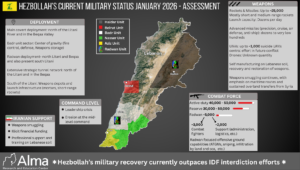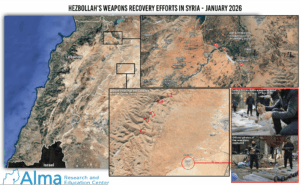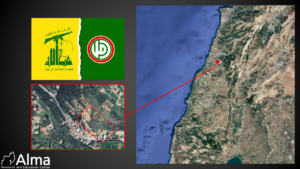Qatar presents two faces to the world, which seemingly contradict each other, but in fact constitute two sides of the same calculated and destructive foreign policy.
This policy positions Qatar both as an essential international mediator, while at the same time it is in practice a central pillar for the Muslim Brotherhood movement, Hamas, and provides hosting and support services to other terrorist elements, while generating regional instability through systematic incitement in the Middle East, and financing anti-Israeli and anti-Western activity throughout the West.
This dynamic was sharply expressed on September 29, 2025, in the trilateral phone call, mediated by U.S. President Donald Trump, between Prime Minister Benjamin Netanyahu and Qatar’s Prime Minister Mohammed Al Thani.
In the call, Netanyahu expressed regret over the death of the Qatari security guard during an Israeli strike against the Hamas leadership in Qatar on September 9, admitted to violating Qatari sovereignty, and pledged that such an event would not happen again.
The apology was an explicit Qatari condition for renewing involvement in the ceasefire negotiations in the Gaza Strip, which Qatar had suspended following the strike.
Trump’s role was crucial. He promoted a 21-point plan and needed Qatar’s influence over Hamas, and Qatar’s support for the plan (which reportedly underwent changes to reflect Israeli war objectives, to the disappointment of the Qataris).
The White House statement emphasized Trump’s desire to put relations with Qatar on a “positive track” after the strike.
There seems to be a direct connection between this desire and agreements signed by the American president with Qatar in May, worth about 1.2 trillion dollars, and the hosting of the U.S. Air Force at Al Udeid Air Base – the largest American base in the Middle East.
The apology was the price Israel paid to the U.S. and in return, the American administration presented a peace plan for the Gaza Strip that accurately represented Israel’s main war objectives (the release of all hostages at once, the dismantling of Hamas’s weapons including tunnels, and the demilitarization of the Strip).
The call led to an agreement on establishing a “tripartite mechanism” to improve coordination and resolve complaints.
This can be framed as a framework imposed by the U.S. to manage the inherent friction between its two allies, rather than as a sign of significant cooperation.
The Israeli strike shattered the tacit understanding that the Hamas leadership was ‘immune’ in Qatar, and forced Qatar to confront the direct security risks of its sponsorship policy.
For years, Israel tolerated the presence of Hamas in Qatar as a ‘necessary evil’ that provided a channel for communication and mediation.
The strike in Doha signaled that there are no more safe havens.
For years, Qatar has hosted the political leadership of Hamas, providing it with a safe and prestigious base of operations from which it directs activities, raises funds, and conducts international diplomacy.
Qatar also for years hosted the Egyptian Islamist preacher Sheikh Yusuf al-Qaradawi, who until his death (in 2022) was the spiritual leader of the Muslim Brotherhood, and who issued Islamic fatwas that permitted jihadist terror organizations to carry out suicide bombings around the world.
The organization he helped found, the International Union of Muslim Scholars, spreads extremist ideas from Qatar throughout the Muslim world and to Muslim communities in the West.
In response to the Israeli strike, Qatar convened an emergency Arab-Islamic summit in Doha on September 15.
At the summit, with the participation of nearly 60 countries, the strike was strongly condemned as a “treacherous and cowardly” violation of Qatari sovereignty.
In the opening speech, the Emir of Qatar, Al Thani, accused Israel of a deliberate attempt “to thwart the negotiations” for a ceasefire in Gaza.
Other leaders, such as Turkish President Erdoğan, called for economic sanctions, while the President of Iran urged for Israel to be isolated.
The summit’s concluding statement expressed “absolute support” for Qatar and condemned the strike.
The Gulf Cooperation Council (GCC) announced it would activate joint defense mechanisms.
However, despite the harsh rhetoric, deep divisions between the countries prevented the adoption of tangible and binding measures, and the summit ended without significant practical results.
But in practice, this conference was a representation of diplomatic hypocrisy in its entirety.
The gap between the speeches of Arab countries regarding Qatar and their actions is the important clue regarding their true perception of this terror-supporting state in the Gulf.
On June 5, 2017, Saudi Arabia, the United Arab Emirates, Bahrain, and Egypt severed all ties with Qatar, imposing a full land, sea, and air blockade on it.
The official reasons were explicit: Qatar’s support for terrorism and extremism, financing of radical groups including the Muslim Brotherhood and Hamas, its warm relations with Iran, and its use of the Al Jazeera network to fuel regional unrest.
These accusations, coming from the heart of the Sunni world, prove that the fear of Qatar’s conduct is not exclusive to Israel, but is shared by the leading Arab powers.
The “Arab Quartet” presented a list of 13 non-negotiable demands, which included shutting down the Al Jazeera network, severing ties with the Muslim Brotherhood, downgrading relations with Iran, and ending the Turkish military presence in Qatar.
Qatar rejected these demands, claiming they constituted a violation of its sovereignty.
The blockade officially ended with the “Al-Ula Declaration” in January 2021. However, it was a cosmetic reconciliation.
It was primarily driven by Saudi Arabia’s desire for regional unity ahead of the incoming Biden administration and a new approach towards Iran.
Qatar did not make significant concessions on the core issues. Its foreign minister explicitly stated that Qatar would not downgrade its relations with Turkey or Iran after the reconciliation.
This means that the underlying reasons for the crisis remained; the reconciliation was a tactical ceasefire, not a strategic peace agreement.
The blockade achieved the opposite result, forcing Qatar to become more independent and resilient.
It deepened its ties with Turkey and Iran out of necessity, strengthened its domestic production, and expanded its global trade routes, ultimately emerging from the crisis as a stronger and more autonomous actor.
The end of the blockade in 2021 was not a Qatari surrender, but a strategic victory for it.
This proves that Qatar’s policy of defiance works, and encourages it to continue its two-track strategy without fear of significant consequences.
A central demand in the 2017 blockade was the closure of Al Jazeera and its affiliates. The “Arab Quartet” saw the network as a platform for Islamist groups, a tool for inciting unrest within their borders, and a mouthpiece for an anti-Saudi and anti-Emirati agenda.
The fact that shutting down Qatar’s central regime mouthpiece was a core demand in such a sharp interstate dispute underscores the perception of Al Jazeera not as a news channel, but as an operational influence and propaganda arm of the Qatari state.
While it appears that Al Jazeera still cannot operate in Saudi Arabia, Bahrain, and Egypt, the UAE rescinded the decision to outlaw the station in 2023 as part of the reconciliation.
Hence, it is reasonable to conclude that this core issue remains unresolved. Saudi Arabia is willing to trade and talk with Qatar, but it still views Al Jazeera as a threat to be kept at a distance.
This proves that the perception of Qatar as a hostile and dangerous actor remains.







2 Responses
Dear Yaakov,
The Qatari regime is clearly a jihaddist force and therefore an illegitimate facade and the illusion of a legitimate government. The death they prepare for Israel will be executed upon their own heads. The so called muslim brotherhood is neither: it is a den of poisonous, venomous snakes. Their empirical caliphate delusions now are ended.
Dear Yaakov,
There may be a lesson we can learn by comparing the golden calf and party life of the children of Israel in Moses day and the prosperity of the Middle East without the execution of God’s Law and Justice today.